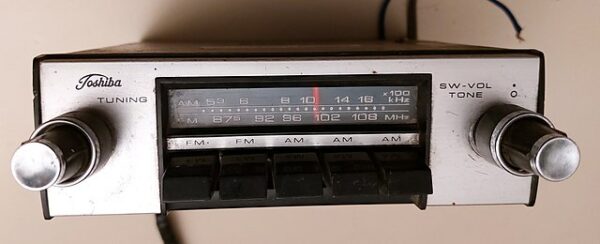Your next car might not have something that has been inside a car for the last 100 years. AM radios are slowly disappearing from vehicles as the major car manufacturers eliminate them from new vehicles. The move has raised concerns, especially from station owners, that Americans may lose vital access to emergency broadcasts and news, but research shows that not too many people still listen to the AM dial.
Automakers, such as BMW, Volkswagen, Mazda and Tesla, are removing AM radios from new electric vehicles because electric engines can interfere with the sound of AM stations. And Ford, one of the nation’s top-three auto sellers, is taking a bigger step, eliminating AM from all of its vehicles, electric or gas-operated, writes The Washington Post.
Some station owners and advertisers contend that losing access to the car dashboard will indeed be a death blow to many of the nation’s 4,185 AM stations — the possible demise of a core element of the nation’s delivery system for news, political talk (especially on the right), coverage of weather emergencies and foreign language programming.
“This is a tone-deaf display of complete ignorance about what AM radio means to Americans,” said Michael Harrison, publisher of Talkers, a trade journal covering the talk radio industry. “It’s not the end of the world for radio, but it is the loss of an iconic piece of American culture.”
Now, although 82 million Americans still listen to AM stations each month, according to the National Association of Broadcasters, the AM audience has been aging for decades. Ford says its data, pulled from internet-connected vehicles, shows that less than 5 percent of in-car listening is to AM stations.
Ford spokesman Alan Hall said that because most AM stations also offer their programming online or on FM sister stations, the automaker will continue to “offer these alternatives for customers to hear their favorite AM radio music and news as we remove [AM] from most new and updated models.” The 2024 Mustang is Ford’s first internal combustion model to be marketed without AM.
“It literally goes through everything, goes through buildings and the way it’s built, it’s meant for an emergency. It’s why we’ve invested to back it all up all over the country for emergencies,” Rep. Josh Gottheimer, D-N.J., told Fox News’ Douglas Kennedy.
Gottheimer, according to Fox News, “has called on the Federal Emergency Management Agency (FEMA) to require carmakers to install AM radios, arguing that even new technologies cannot replace the reach of an AM signal.
Senator Ed Markey, from Massachusetts, has also spoken out against removing AM radios from vehicles. He said, “Broadcast AM radio is an essential part of our emergency alert infrastructure, but the responses to my letter show that far too many automakers are ignoring the critical safety benefits of AM radio.”
“Although many automakers suggested that other communication tools — such as internet radio — could replace broadcast AM radio, in an emergency, drivers might not have access to the internet and could miss critical safety information,” he continued. “The truth is that broadcast AM radio is irreplaceable. As the auto industry rightfully replaces the internal combustion engine with electric batteries, I will continue to work to ensure that automakers maintain access to broadcast AM radio in all their vehicles.”
Despite concerns, manufacturers have added that they fear interference between electromagnetic frequencies from their electric motors and AM radio frequencies, which can lead to buzzing noises and weak signals.
Automakers have said that the concerns about not having AM radios is overblown. Axios noted that “the trade association Alliance for Automotive Innovation also points out that FEMA’s public warning system is designed to provide redundant alerts across multiple outlets: text messages, the Emergency Alert System on radio and television stations, and the National Oceanic and Atmospheric Administration’s weather radio.
‘The intent is not for the public to rely on one sole source to receive the alerts but to create a ‘net’ of sources in which the public can receive them,’ Garrick Francis, vice president of federal affairs for the alliance, wrote in a letter to Markey.”
[Read More: Twitter Gets New CEO, Tesla Stock Owners Breathe Sigh Of Relief]



